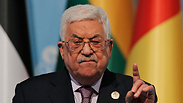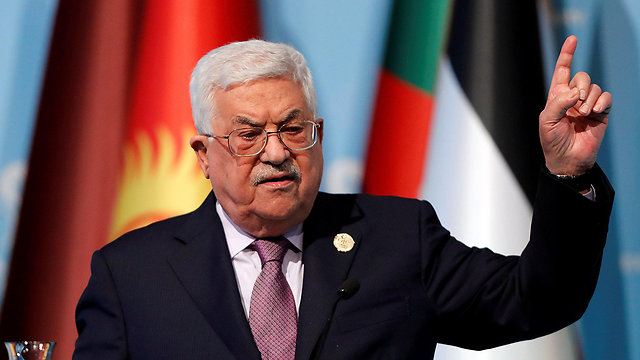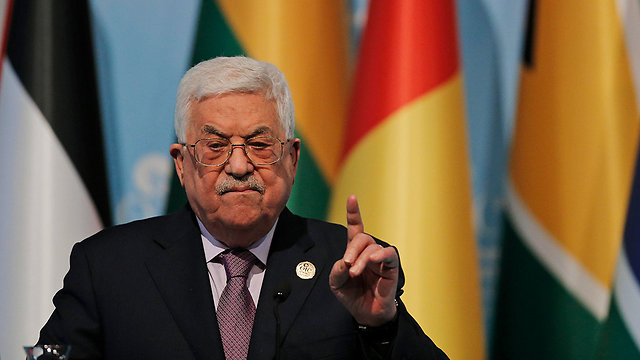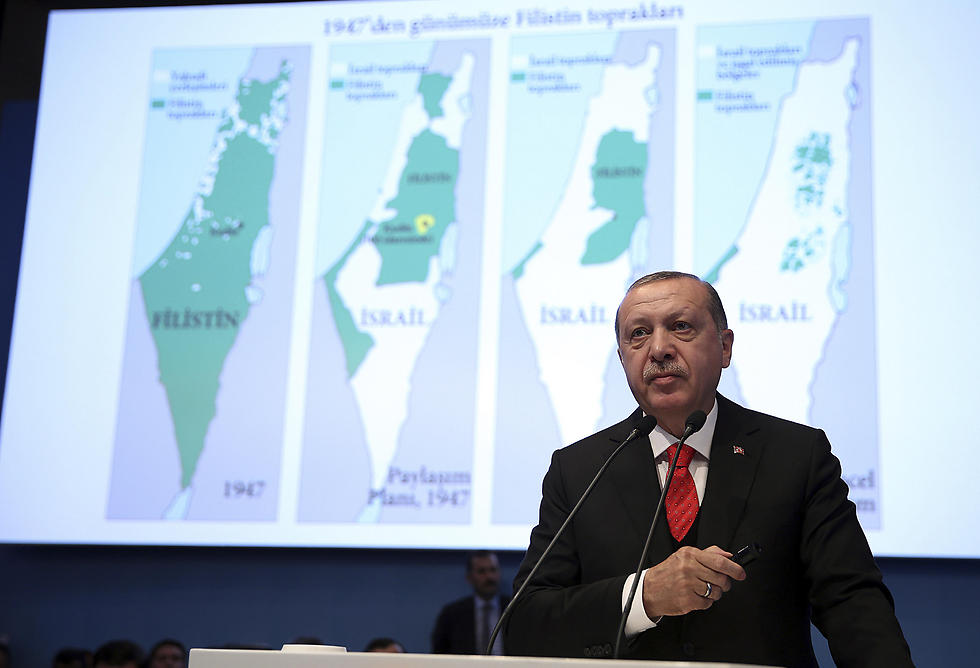
Mahmoud Abbas
Photo: AP
Breaking with years of courting the US, Palestinian President Mahmoud Abbas called Wednesday for the United Nations to replace Washington as a Mideast mediator and suggested he might not cooperate with the Trump administration's much-anticipated effort to hammer out an Israeli-Palestinian peace deal.
At a summit in Turkey, Arab and Muslim leaders "rejected and condemned" President Donald Trump's recognition of Jerusalem as Israel's capital—the trigger for Abbas' sharp policy pivot—but stopped short of backing his more combative approach toward Washington.
A possible Palestinian refusal to engage with the US and growing backlash against Trump's shift on Jerusalem, including from Arab allies, cast new doubt over the administration's already seemingly remote chances of brokering a deal and succeeding where its predecessors have failed.
A senior White House official said the administration will continue to work on a Mideast plan "that we hope will offer the best outcome for both peoples" and will present it when the time is right. The official spoke on condition of anonymity in advance of an expected public statement later Wednesday.
In seemingly shunning the US, Abbas finds himself in uncharted territory.
Trump's recognition of Jerusalem as Israel's capital was decried by Palestinians and others in the region as a provocative show of pro-Israel bias, which many said made it difficult for Abbas to justify dealing with Washington as a mediator.
Trump's argument that his announcement does not mean an endorsement of specific boundaries of Israeli sovereignty in Jerusalem has not gained traction in the ensuing uproar.
The fate of Jerusalem is a hot-button issue in the region, and even the leaders of Saudi Arabia and Egypt—reportedly eager to help advance Trump's Mideast efforts—cannot afford to be seen as soft on the religious claims of Muslims and political claims of Palestinians to the contested city.
Wednesday's extraordinary summit of the 57-member Organization of Islamic Cooperation ended with a call on Trump to rescind an "unlawful decision that might trigger chaos in the region" and on the world to recognize east Jerusalem as the capital of a state of Palestine.
The final statement lacked tougher criticism of US policy contained in an earlier draft, which questioned Washington's continued role as a Mideast mediator and warned that Trump's shift on Jerusalem threatened global security.
Turkish President Recep Tayyip Erdogan, who hosted the summit, stuck to the harder line, saying at a news conference that it is "out of the question" for Washington to continue mediating between Israel and the Palestinians.
"That process is now over," he said.
Abbas' speech marked a high-profile break with what had been his unwavering policy in more than a decade as Palestinian leader.
Despite setbacks, he had considered a close relationship with the US the centerpiece of his efforts to win Palestinian statehood through negotiations.
When Trump was elected a year ago, Abbas went out of his way not to criticize the new president, for fear of harming the relationship.
On Wednesday, he expressed a sense of betrayal.
"We were shocked by the US administration," Abbas said. "While we engaged with them in the peace process for the sake of a deal for the ages, (Trump) delivered a slap for the ages."
Abbas said the United States has disqualified itself as a mediator. "We will no longer accept that it has a role in the political process," Abbas said.
In another sign of a harder Palestinian stance, Abbas aides said earlier this week that he would not meet with Mike Pence when the US vice president visits the region, starting this weekend.
Abbas was initially to have hosted Pence, a devout Christian, in the biblical West Bank town of Bethlehem, following the vice president's visit to Israel.
Trump's nod to Israel on Jerusalem came at a time of mounting speculation about the terms of an Israeli-Palestinian deal the US might propose.
Palestinian officials have said they have not heard anything official from the US team led by Trump son-in-law Jared Kushner or from the powerful Saudi crown prince who met Abbas last month.
Saudi Arabia did not participate in a high-level capacity in Wednesday's summit.
But in Riyadh, King Salman and his heir met Wednesday with Abu Dhabi Crown Prince Mohammed bin Zayed Al Nahyan, who also leads the United Arab Emirates' armed forces. A statement said they discussed "the serious repercussions of the negative decision of the US to recognize Jerusalem as the capital of Israel."
In Israel, Prime Minister Benjamin Netanyahu appeared to criticize Abbas' comments, though he did not directly refer to the Palestinian leader.
Netanyahu said in a speech Wednesday that Palestinians should "work for peace and not for extremism."
"All of these declarations do not impress us," Netanyahu said.
He said Israel is committed to protecting the freedom of worship for all religions in Jerusalem, but reaffirmed Israel's claims to the entire city.
Israel has considered Jerusalem its capital since the state's establishment in 1948 and sees the city as the ancient capital of the Jewish people



















